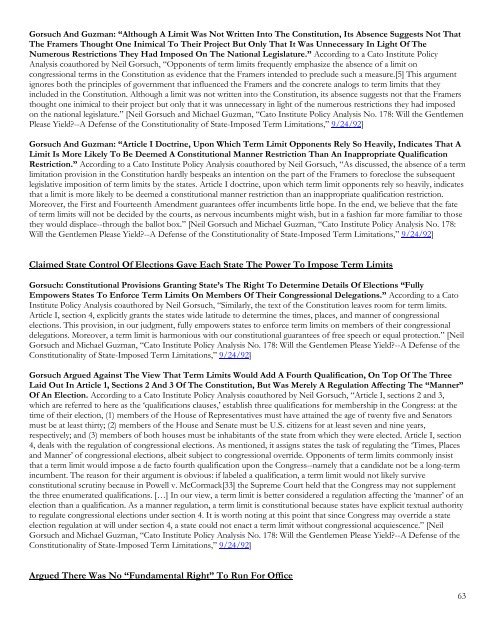Create successful ePaper yourself
Turn your PDF publications into a flip-book with our unique Google optimized e-Paper software.
<strong>Gorsuch</strong> And Guzman: “Although A Limit Was Not Written Into The Constitution, Its Absence Suggests Not That<br />
The Framers Thought One Inimical To Their Project But Only That It Was Unnecessary In Light Of The<br />
Numerous Restrictions They Had Imposed On The National Legislature.” According to a Cato Institute Policy<br />
Analysis coauthored by <strong>Neil</strong> <strong>Gorsuch</strong>, “Opponents of term limits frequently emphasize the absence of a limit on<br />
congressional terms in the Constitution as evidence that the Framers intended to preclude such a measure.[5] This argument<br />
ignores both the principles of government that influenced the Framers and the concrete analogs to term limits that they<br />
included in the Constitution. Although a limit was not written into the Constitution, its absence suggests not that the Framers<br />
thought one inimical to their project but only that it was unnecessary in light of the numerous restrictions they had imposed<br />
on the national legislature.” [<strong>Neil</strong> <strong>Gorsuch</strong> and Michael Guzman, “Cato Institute Policy Analysis No. 178: Will the Gentlemen<br />
Please Yield?--A Defense of the Constitutionality of State-Imposed Term Limitations,” 9/24/92]<br />
<strong>Gorsuch</strong> And Guzman: “Article I Doctrine, Upon Which Term Limit Opponents Rely So Heavily, Indicates That A<br />
Limit Is More Likely To Be Deemed A Constitutional Manner Restriction Than An Inappropriate Qualification<br />
Restriction.” According to a Cato Institute Policy Analysis coauthored by <strong>Neil</strong> <strong>Gorsuch</strong>, “As discussed, the absence of a term<br />
limitation provision in the Constitution hardly bespeaks an intention on the part of the Framers to foreclose the subsequent<br />
legislative imposition of term limits by the states. Article I doctrine, upon which term limit opponents rely so heavily, indicates<br />
that a limit is more likely to be deemed a constitutional manner restriction than an inappropriate qualification restriction.<br />
Moreover, the First and Fourteenth Amendment guarantees offer incumbents little hope. In the end, we believe that the fate<br />
of term limits will not be decided by the courts, as nervous incumbents might wish, but in a fashion far more familiar to those<br />
they would displace--through the ballot box.” [<strong>Neil</strong> <strong>Gorsuch</strong> and Michael Guzman, “Cato Institute Policy Analysis No. 178:<br />
Will the Gentlemen Please Yield?--A Defense of the Constitutionality of State-Imposed Term Limitations,” 9/24/92]<br />
Claimed State Control Of Elections Gave Each State The Power To Impose Term Limits<br />
<strong>Gorsuch</strong>: Constitutional Provisions Granting State’s The Right To Determine Details Of Elections “Fully<br />
Empowers States To Enforce Term Limits On Members Of Their Congressional Delegations.” According to a Cato<br />
Institute Policy Analysis coauthored by <strong>Neil</strong> <strong>Gorsuch</strong>, “Similarly, the text of the Constitution leaves room for term limits.<br />
Article I, section 4, explicitly grants the states wide latitude to determine the times, places, and manner of congressional<br />
elections. This provision, in our judgment, fully empowers states to enforce term limits on members of their congressional<br />
delegations. Moreover, a term limit is harmonious with our constitutional guarantees of free speech or equal protection.” [<strong>Neil</strong><br />
<strong>Gorsuch</strong> and Michael Guzman, “Cato Institute Policy Analysis No. 178: Will the Gentlemen Please Yield?--A Defense of the<br />
Constitutionality of State-Imposed Term Limitations,” 9/24/92]<br />
<strong>Gorsuch</strong> Argued Against The View That Term Limits Would Add A Fourth Qualification, On Top Of The Three<br />
Laid Out In Article 1, Sections 2 And 3 Of The Constitution, But Was Merely A Regulation Affecting The “Manner”<br />
Of An Election. According to a Cato Institute Policy Analysis coauthored by <strong>Neil</strong> <strong>Gorsuch</strong>, “Article I, sections 2 and 3,<br />
which are referred to here as the ‘qualifications clauses,’ establish three qualifications for membership in the Congress: at the<br />
time of their election, (1) members of the House of Representatives must have attained the age of twenty five and Senators<br />
must be at least thirty; (2) members of the House and Senate must be U.S. citizens for at least seven and nine years,<br />
respectively; and (3) members of both houses must be inhabitants of the state from which they were elected. Article I, section<br />
4, deals with the regulation of congressional elections. As mentioned, it assigns states the task of regulating the ‘Times, Places<br />
and Manner’ of congressional elections, albeit subject to congressional override. Opponents of term limits commonly insist<br />
that a term limit would impose a de facto fourth qualification upon the Congress--namely that a candidate not be a long-term<br />
incumbent. The reason for their argument is obvious: if labeled a qualification, a term limit would not likely survive<br />
constitutional scrutiny because in Powell v. McCormack[33] the Supreme Court held that the Congress may not supplement<br />
the three enumerated qualifications. […] In our view, a term limit is better considered a regulation affecting the ‘manner’ of an<br />
election than a qualification. As a manner regulation, a term limit is constitutional because states have explicit textual authority<br />
to regulate congressional elections under section 4. It is worth noting at this point that since Congress may override a state<br />
election regulation at will under section 4, a state could not enact a term limit without congressional acquiescence.” [<strong>Neil</strong><br />
<strong>Gorsuch</strong> and Michael Guzman, “Cato Institute Policy Analysis No. 178: Will the Gentlemen Please Yield?--A Defense of the<br />
Constitutionality of State-Imposed Term Limitations,” 9/24/92]<br />
Argued There Was No “Fundamental Right” To Run For Office<br />
63


